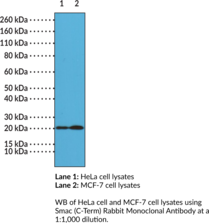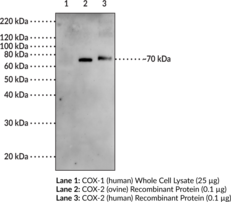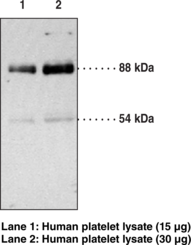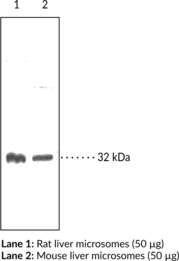Description
Smac is a mitochondrial protein involved in the initiation of apoptosis.{8246} It is a ubiquitously expressed α-helical protein that forms homodimers.{8246,59207} It is localized to the mitochondria but is released following apoptotic stimuli into the cytoplasm, where it binds to inhibitor of apoptosis proteins (IAPs), which are overexpressed in a variety of cancer cells.{8246,59208} Smac binding to IAPs blocks their inhibitory effect on caspase-3, -7, and -9 and leads to the activation of apoptosis.{59209,59208} Knockout of DIABLO, the gene encoding Smac, in colon cancer cells in vitro induces resistance to apoptosis induced by NSAIDs and TRAIL, but not cisplatin (Item No. 13119), mitomycin C (Item No. 11435), or camptothecin (Item No. 11694).{59210} DIABLO knockout in mice does not induce changes in apoptosis or tumorigenesis, indicating a redundancy of its function.{59208} Overexpression of DIABLO in vitro does not affect basal levels of apoptosis but increases the sensitivity of cells to other apoptotic stimuli.{59211} Cayman’s Smac Rabbit Monoclonal Antibody can be used for immunohistochemistry (IHC) and Western blot (WB) applications.
Synonyms: DIABLO|Diablo Homolog, Mitochondrial|Direct IAP-binding Protein with Low pI|Second Mitochondria-derived Activator of Caspase
Immunogen: Peptide from the C-terminal region of human Smac
Formulation: 100 µl of protein A-affinity purified monoclonal antibody
Isotype: IgG
Applications: IHC and WB
Origin:
Stability: 365 days
Application|Immunohistochemistry||Application|Western Blot||Product Type|Antibodies|Monoclonal Antibodies||Research Area|Cancer|Cell Death|Apoptosis||Research Area|Cell Biology|Cell Death|Apoptosis||Research Area|Cell Biology|Mitochondrial Biology||Research Area|Cell Biology|Proteolysis|Cytosolic & Secreted Proteases




